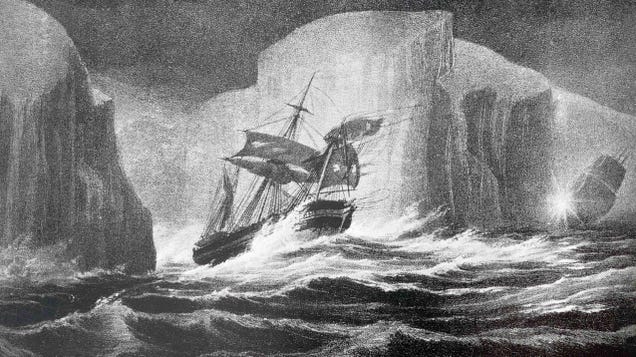The Enigmatic Legacy of Captain John Franklin’s Arctic Expedition
The tragic tale of Captain John Franklin’s 1845 expedition to discover a navigable route through the Northwest Passage has long fascinated historians and adventurers alike. This ill-fated journey, which resulted in the loss of all 129 crew members, has been the subject of numerous studies, novels, and documentaries. Recent scientific findings have provided new insights into the grim fate of the sailors, particularly shedding light on the harrowing circumstances that led to acts of cannibalism among the crew.
Understanding the Historical Context
In the mid-19th century, the quest for the Northwest Passage was driven by the promise of a shorter trade route between Europe and Asia. Franklin, an experienced explorer, set sail with two ships, HMS Erebus and HMS Terror, equipped with the latest technology of the time, including steam engines and advanced navigation tools. However, the expedition faced immediate challenges, including harsh Arctic conditions and ice entrapment.
The ships became trapped in ice in 1846, leading to a desperate struggle for survival. The crew attempted to escape by foot, but the unforgiving environment and lack of resources proved insurmountable. Over the years, various expeditions have sought to uncover the fate of Franklin and his men, with discoveries of artifacts and remains providing clues to their ordeal.
Revelations from Recent Scientific Studies
A recent scientific paper has brought new clarity to the tragic events that unfolded during the expedition. Researchers conducted a detailed analysis of human remains recovered from the Arctic, revealing evidence of cannibalism. Among the findings was the confirmation that James Fitzjames, the captain of HMS Erebus, was one of the first victims of this desperate act.
This revelation not only highlights the extreme conditions faced by the crew but also raises questions about the psychological toll of such dire circumstances. According to Dr. Andrew Murray, a leading anthropologist involved in the study, “The evidence of cannibalism underscores the lengths to which these men went to survive. It challenges our perceptions of human behavior in life-and-death situations.”
Exploring the Psychological Impact of Survival Situations
The psychological implications of survival situations have been a topic of interest in both psychology and anthropology. The phenomenon known as “survival cannibalism” occurs when individuals resort to consuming human flesh to stay alive. This behavior, while often viewed through a lens of horror, can be understood as a primal instinct to survive when all other options have been exhausted.
In the case of Franklin’s crew, the combination of isolation, extreme cold, and dwindling supplies likely led to a breakdown of social norms. Dr. Lisa H. Smith, a psychologist specializing in trauma, notes, “In extreme survival scenarios, the human psyche can undergo significant changes. The instinct to survive can override moral considerations, leading to choices that would be unthinkable under normal circumstances.”
Lessons from the Franklin Expedition
The story of Captain Franklin’s expedition serves as a poignant reminder of the vulnerabilities inherent in exploration, particularly in uncharted territories. It also emphasizes the importance of preparation and adaptability in the face of unforeseen challenges. Modern explorers and adventurers can draw valuable lessons from this historical event, particularly regarding risk assessment and contingency planning.
Furthermore, the expedition’s legacy continues to resonate in contemporary discussions about climate change and its impact on Arctic regions. As ice melts and new shipping routes emerge, the lessons learned from Franklin’s journey remain relevant. Understanding the historical context of Arctic exploration can inform current policies and practices as we navigate the complexities of environmental change.
The Ongoing Fascination with Franklin’s Voyage
The enduring intrigue surrounding Captain John Franklin’s expedition is a testament to humanity’s fascination with the unknown. The combination of adventure, tragedy, and the quest for knowledge captures the imagination and invites reflection on the limits of human endurance.
As new discoveries continue to emerge, the story of Franklin and his crew evolves, offering fresh insights into the human experience. Whether viewed through the lens of history, psychology, or environmental science, the legacy of this ill-fated voyage remains a powerful narrative that speaks to the complexities of exploration and survival.
In conclusion, the tragic fate of Captain John Franklin’s expedition is not merely a historical footnote; it is a profound exploration of human resilience, the moral dilemmas of survival, and the lessons that continue to inform our understanding of exploration in the modern world.

